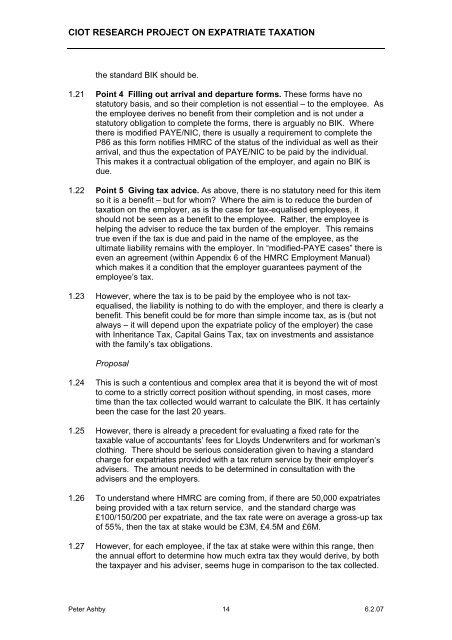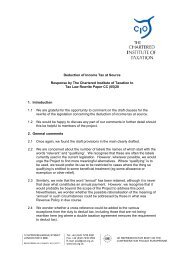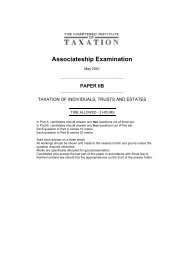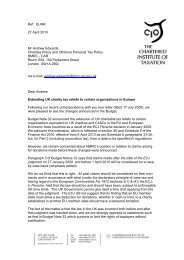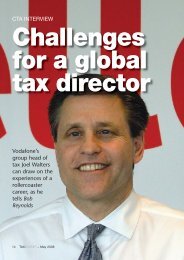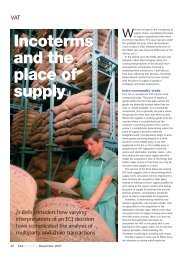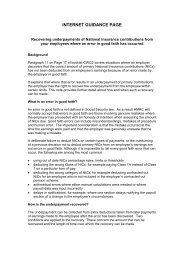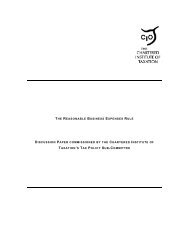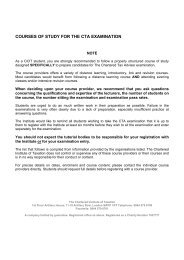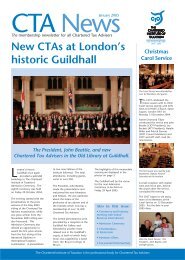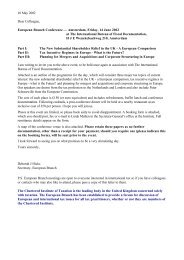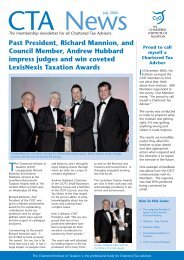Expatriate taxation - CIOT - The Chartered Institute of Taxation
Expatriate taxation - CIOT - The Chartered Institute of Taxation
Expatriate taxation - CIOT - The Chartered Institute of Taxation
You also want an ePaper? Increase the reach of your titles
YUMPU automatically turns print PDFs into web optimized ePapers that Google loves.
<strong>CIOT</strong> RESEARCH PROJECT ON EXPATRIATE TAXATION<br />
the standard BIK should be.<br />
1.21 Point 4 Filling out arrival and departure forms. <strong>The</strong>se forms have no<br />
statutory basis, and so their completion is not essential – to the employee. As<br />
the employee derives no benefit from their completion and is not under a<br />
statutory obligation to complete the forms, there is arguably no BIK. Where<br />
there is modified PAYE/NIC, there is usually a requirement to complete the<br />
P86 as this form notifies HMRC <strong>of</strong> the status <strong>of</strong> the individual as well as their<br />
arrival, and thus the expectation <strong>of</strong> PAYE/NIC to be paid by the individual.<br />
This makes it a contractual obligation <strong>of</strong> the employer, and again no BIK is<br />
due.<br />
1.22 Point 5 Giving tax advice. As above, there is no statutory need for this item<br />
so it is a benefit – but for whom Where the aim is to reduce the burden <strong>of</strong><br />
<strong>taxation</strong> on the employer, as is the case for tax-equalised employees, it<br />
should not be seen as a benefit to the employee. Rather, the employee is<br />
helping the adviser to reduce the tax burden <strong>of</strong> the employer. This remains<br />
true even if the tax is due and paid in the name <strong>of</strong> the employee, as the<br />
ultimate liability remains with the employer. In “modified-PAYE cases” there is<br />
even an agreement (within Appendix 6 <strong>of</strong> the HMRC Employment Manual)<br />
which makes it a condition that the employer guarantees payment <strong>of</strong> the<br />
employee’s tax.<br />
1.23 However, where the tax is to be paid by the employee who is not taxequalised,<br />
the liability is nothing to do with the employer, and there is clearly a<br />
benefit. This benefit could be for more than simple income tax, as is (but not<br />
always – it will depend upon the expatriate policy <strong>of</strong> the employer) the case<br />
with Inheritance Tax, Capital Gains Tax, tax on investments and assistance<br />
with the family’s tax obligations.<br />
Proposal<br />
1.24 This is such a contentious and complex area that it is beyond the wit <strong>of</strong> most<br />
to come to a strictly correct position without spending, in most cases, more<br />
time than the tax collected would warrant to calculate the BIK. It has certainly<br />
been the case for the last 20 years.<br />
1.25 However, there is already a precedent for evaluating a fixed rate for the<br />
taxable value <strong>of</strong> accountants’ fees for Lloyds Underwriters and for workman’s<br />
clothing. <strong>The</strong>re should be serious consideration given to having a standard<br />
charge for expatriates provided with a tax return service by their employer’s<br />
advisers. <strong>The</strong> amount needs to be determined in consultation with the<br />
advisers and the employers.<br />
1.26 To understand where HMRC are coming from, if there are 50,000 expatriates<br />
being provided with a tax return service, and the standard charge was<br />
£100/150/200 per expatriate, and the tax rate were on average a gross-up tax<br />
<strong>of</strong> 55%, then the tax at stake would be £3M, £4.5M and £6M.<br />
1.27 However, for each employee, if the tax at stake were within this range, then<br />
the annual effort to determine how much extra tax they would derive, by both<br />
the taxpayer and his adviser, seems huge in comparison to the tax collected.<br />
Peter Ashby 14 6.2.07


